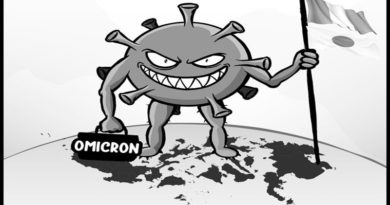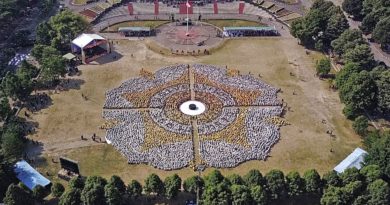OP ED COLUMN- OPINION: Anti-Duterte/Marcos line in Robredo’s candidacy

However the final alignments may turn out by mid-November, Vice President Leni Robredo’s declaration to run in the May 2022 presidential race stands out as being clearly opposed to both Duterte’s bid to remain in power and the Marcoses’ ambition to return to Malacanang.
At the same time that her candidacy distinguishes itself from other aspirants, Robredo’s move to run as an independent – not as the candidate of the Liberal Party, which she chairs – speaks volumes.
It denotes her wish to be regarded by the people as her own persona – a dedicated, humble widowed mother and principled, competent public servant as she has shown herself to be in the past five years – and not as a political party figurehead, or a “traditional politician.”
In her declaration before filing her certificate of candidacy on Thursday, Robredo said:
“I vow today to pour all my strength not just until the elections but for the rest of my days, to fight for the Philippines of our dreams. Today I stand with full resolve: We must free ourselves from the current situation. I will fight, we will fight.”
“I am a mother who sees the suffering of my beloved country,” Robredo went on, adding: “I firmly believe: Love is not measured by forbearance alone, but by a readiness to do battle. Whoever loves must do battle for the beloved.”
Asserting that her motivation in running for president is to help end a government marked by “corruption, incompetence and lack of compassion,” she appealed to the people: “Let us move as a country towards a future that is just and humane, where every Filipino has a chance to succeed and where the strength of one becomes the singular strength of all.”
She ended with a note of confidence: “I trust without any doubt that we will be victorious.”
Towards achieving that vision, Robredo will continue to pursue talks with other presidential aspirants towards forging the broadest possible united opposition to the Duterte-Marcos joint forces in the May elections, according to her spokesperson. She and her supporters and allies have a window to work that out until Nov. 15.
1Sambayan, a coalition of organizations and individuals which has been working towards a unified opposition and which nominated Robredo on Sept. 30, warned on Thursday: “Make no mistake about it, we are up against the vast resources of the Duterte administration. If we remain divided, we will stand to lose more than just the elections; we will lose our country, our democracy and integrity in public service.”
The coming days will be crucial for the pursuit of unification efforts.
Meantime, President Duterte is getting himself and his presidency mired in an ugly fight against the Senate’s investigation, through its Blue Ribbon (anti-corruption) committee, into the health department’s controversial P11-billion supply deal for anti-COVID-19 equipment with the Pharmally Pharmaceutical Corporation, whose declared capitalization was only a little over P600,000.
Protests and criticisms have rained down on his latest move to ban officials of the executive department from appearing before the Senate, as well as his threat to arrest senators should any of such officials be cited for contempt. Notably, the Integrated Bar of the Philippines and the Philippine Bar Association have warned about his probable violation of constitutional principles and provisions.
Duterte has also had to grudgingly acknowledge his falling performance approval ratings in the latest (September) Pulse Asia survey on a broad range of issues. The biggest drop – 12 points, from 64 percent in June to 52 percent last month; 25 points, from 77 percent in September 2020 – was in the fight against corruption.
The corruption issue is the one about which Duterte seems to be particularly touchy: “The administration may put up a brave face,” observed the IBON Data Foundation, “but it’s definitely getting alarmed by how its electoral prospects are steadily getting eroded by corruption cases getting closer and closer” to the President.
Furthermore, the think tank added, people are increasingly blaming the government for their health worries and economic difficulties.
Surveys show that Duterte’s approval ratings have been declining on a lengthening list of issues: fighting crime, enforcing the rule of law, controlling the COVID-19 spread, asserting national sovereignty in the West Philippine Sea, responding to calamities and disasters, stopping environmental destruction, help for those who lost their jobs, reducing poverty, protecting overseas Filipino workers and promoting peace.
Besides his administration’s plunging approval ratings, Duterte has to seriously face up to the issues of extrajudicial killings and other human rights violations in both his continuing “war on drugs” and the “whole-of-nation” approach to the intensified counterinsurgency operations.
In both cases, the international human rights community is calling for “independent, impartial, international investigations” and the accountability of the parties responsible for the killings and related violations.
From the International Criminal Court (ICC), the new prosecutor, Karim Khan, last Wednesday promised to conduct such an investigation in the Philippines, as authorized by the court’s Pre-Trial Chamber.
“My investigation will seek to uncover the truth and aims to ensure accountability,” Khan said. “We will focus on efforts on ensuring a successful independent and impartial investigation. We aim to bring justice to the victims and affected communities, and count on the support and cooperation of State parties, civil society and other partners,” he added.
Last Monday, Duterte said he would be ready to face the eventual charges against him – “crimes against humanity of murder” which are under ICC jurisdiction.
“I will wait for you,” he said in a show of bravado, apparently referring to the ICC prosecutor. “I will prepare for my defense.” Just tell the truth, he said: “Huwag lang kayong magsinungaling.”
At the United Nations, human rights high commissioner Michelle Bachelet welcomed the ICC decision to begin a full investigation in the country. “This process brings into sharp focus the issue of the ability and willingness of domestic accountability (Philippine government) mechanisms to produce clear and measurable results,” she emphasized.
* * *
Email: [email protected]












